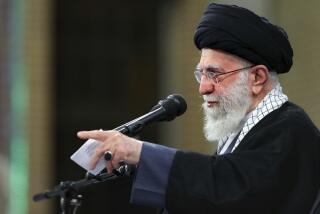Response to U.S. Moves Shows Arab Ambivalence
- Share via
AMMAN, Jordan — For the five years since the Persian Gulf War, Arab leaders have been waiting for the other shoe to drop in Iraq, and it has not happened: Dictator Saddam Hussein clings to power in Baghdad--belligerent, violent and dreaming of revenge.
Now, even some of America’s strongest allies in the Arab world are telling President Clinton that the United States should either marshal the forces necessary to topple Hussein or acknowledge that he is here to stay and adjust its policies accordingly.
In the eyes of many Arabs, the waiting game has gone on too long.
But while many Arab politicians and opinion-makers freely criticize the U.S.-led strategy of isolating Hussein, maintaining tough sanctions and privately hoping for a coup to bring him down, most Arab analysts concede that they have no better plan for dealing with him.
“The Arabs . . . don’t know what to do about Saddam Hussein,” said Tewfik Mishlawi, editor of the Beirut-based Middle East Reporter. “Most of them don’t like him to be there but don’t know how to get rid of him.”
What the lack of support for this week’s military action by Clinton against Hussein did illustrate vividly is a disillusionment with the current stalemate that leaves a question mark over one of the Arab world’s most important countries.
Typifying the mood was Egypt, which had rallied most of the Arab world to join in the anti-Hussein coalition in 1990. This time, Egyptian public opinion has been sharply critical of the U.S. missile strikes. The semiofficial newspaper Al Ahram declared Wednesday that the post-Gulf War era of confrontation with Iraq should end.
“It is illogical for the international and regional parties to go back to the same confrontation of six years ago,” the newspaper said in its lead editorial. “The Arab world does not need any more crises.”
Abdel Moneim Said, director of Egypt’s Al Ahram Center of Political and Strategic Studies, said a major reason that the anti-Hussein consensus has been breaking down is that fears of Iraq’s traditional rival, Iran, are on the rise--especially among the Gulf Arab states.
Iran has a rising military capacity and an Islamic identity that resonates among the Arab masses, and Tehran is showing increasing aggressiveness toward its neighbors, Said said.
If Iran became dominant in Kurdish areas of northern Iraq, it then would have an unbroken territorial link to Syria, its chief Arab ally. The resulting Iranian-Kurdish-Syrian axis would threaten not only Hussein’s regime in Baghdad but Jordan and Israel as well, suggested Mishlawi.
Iraq has served as a regional counterbalance to Iran. The Iraqi government said its foray into northern Iraq was aimed mainly at keeping Iran from gaining a toehold there.
To many Arabs, Hussein was defending Iraq’s sovereignty.
Moreover, Arabs widely view Hussein’s acting on behalf of one Kurdish faction against another as an internal matter. In general, said George Hawatmeh, editor of the Jordan Times newspaper in Amman, criticism of this week’s U.S. attack can be divided into three camps: those who oppose any attack by Americans on a Muslim country; those who feel that this U.S. intervention lacked purpose and was a campaign ploy by Clinton; and those who feel that what is needed is much more determined action to depose Hussein.
Already, support for isolating Iraq is unraveling. Countries like Oman, Qatar and the United Arab Emirates have called for an end to the U.N. sanctions imposed after the Gulf War; other Arab states are leaning that way.
Jordan, torn between King Hussein’s wish to ally with the United States and its population’s traditional affinity with Iraq, tilted this time against U.S. military action. Under criticism from his subjects for his peace moves toward Israel--and for an austerity program required by the International Monetary Fund that prompted bread riots three weeks ago--the king refused to allow Jordanian bases to be used to stage the U.S. attack.
Another longtime American ally, Saudi Arabia, also refused direct assistance. Its government faces internal opponents who already accuse King Fahd and the royal family of being American lackeys.
“We will not have the unanimity we had in the past,” political columnist Mohammed Sid Ahmed said, speaking from Cairo. “An important constituency stood with the United States then, but this will not happen this time.”
More to Read
Sign up for Essential California
The most important California stories and recommendations in your inbox every morning.
You may occasionally receive promotional content from the Los Angeles Times.










